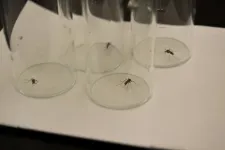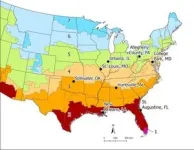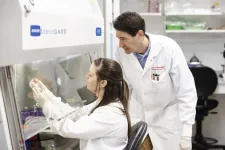(Press-News.org) Certain populations of mosquitoes are more heat tolerant and better equipped to survive heat waves than others, according to new research from Washington University in St. Louis.
This is bad news in a world where vector-borne diseases are an increasingly global health concern. Most models that scientists use to estimate vector-borne disease risk currently assume that mosquito heat tolerances do not vary. As a result, these models may underestimate mosquitoes’ ability to spread diseases in a warming world.
Researchers led by Katie M. Westby, a senior scientist at Tyson Research Center, Washington University’s environmental field station, conducted a new study that measured the critical thermal maximum (CTmax), an organism’s upper thermal tolerance limit, of eight populations of the globally invasive tiger mosquito, Aedes albopictus. The tiger mosquito is a known vector for many viruses including West Nile, chikungunya and dengue.
“We found significant differences across populations for both adults and larvae, and these differences were more pronounced for adults,” Westby said. The new study is published Jan. 8 in Frontiers in Ecology and Evolution.
Westby’s team sampled mosquitoes from eight different populations spanning four climate zones across the eastern United States, including mosquitoes from locations in New Orleans; St. Augustine, Fla.; Huntsville, Ala.; Stillwater, Okla.; St. Louis; Urbana, Ill.; College Park, Md.; and Allegheny County, Pa.
The scientists collected eggs in the wild and raised larvae from the different geographic locations to adult stages in the lab, tending the mosquito populations separately as they continued to breed and grow. The scientists then used adults and larvae from subsequent generations of these captive-raised mosquitoes in trials to determine CTmax values, ramping up air and water temperatures at a rate of 1 degree Celsius per minute using established research protocols.
The team then tested the relationship between climatic variables measured near each population source and the CTmax of adults and larvae. The scientists found significant differences among the mosquito populations.
The differences did not appear to follow a simple latitudinal or temperature-dependent pattern, but there were some important trends. Mosquito populations from locations with higher precipitation had higher CTmax values. Overall, the results reveal that mean and maximum seasonal temperatures, relative humidity and annual precipitation may all be important climatic factors in determining CTmax.
“Larvae had significantly higher thermal limits than adults, and this likely results from different selection pressures for terrestrial adults and aquatic larvae,” said Benjamin Orlinick, first author of the paper and a former undergraduate research fellow at Tyson Research Center. “It appears that adult Ae. albopictus are experiencing temperatures closer to their CTmax than larvae, possibly explaining why there are more differences among adult populations.”
“The overall trend is for increased heat tolerance with increasing precipitation,” Westby said. “It could be that wetter climates allow mosquitoes to endure hotter temperatures due to decreases in desiccation, as humidity and temperature are known to interact and influence mosquito survival.”
Little is known about how different vector populations, like those of this kind of mosquito, are adapted to their local climate, nor the potential for vectors to adapt to a rapidly changing climate. This study is one of the few to consider the upper limits of survivability in high temperatures — akin to heat waves — as opposed to the limits imposed by cold winters.
“Standing genetic variation in heat tolerance is necessary for organisms to adapt to higher temperatures,” Westby said. “That’s why it was important for us to experimentally determine if this mosquito exhibits variation before we can begin to test how, or if, it will adapt to a warmer world.”
Future research in the lab aims to determine the upper limits that mosquitoes will seek out hosts for blood meals in the field, where they spend the hottest parts of the day when temperatures get above those thresholds, and if they are already adapting to higher temperatures. “Determining this is key to understanding how climate change will impact disease transmission in the real world,” Westby said. “Mosquitoes in the wild experience fluctuating daily temperatures and humidity that we cannot fully replicate in the lab.”
END
Some mosquitoes like it hot
Mosquito heat tolerance varies by population, according to a new study; findings could change estimates of vector-borne disease risk
2024-01-08
ELSE PRESS RELEASES FROM THIS DATE:
Out-of-pocket cost increase could put HIV prevention medications out of reach
2024-01-08
PHILADELPHIA – Increasing patients’ out of pocket costs for HIV pre-exposure prophylaxis (PrEP), medications, which have been shown to dramatically reduce the risk of HIV infection, could lead to a significant reduction in PrEP use and a rise in HIV infection rates, according to a new study co-led by researchers at the Perelman School of Medicine at the University of Pennsylvania and Johns Hopkins Bloomberg School of Public Health.
The study, published today in Health Affairs, was designed, in part, to explore the impact that out-of-pocket cost increases could have, depending on the outcome of an ongoing court case challenging certain ...
Survey finds majority of Americans think bariatric surgery is a shortcut to losing pounds, should only be a last resort
2024-01-08
Orlando, Fla - More than two in five U.S. adults suffer from obesity, an epidemic that continues to trend upward. While bariatric surgery is an extremely effective treatment option, a new national survey by Orlando Health reveals common stigmas that may deter those who qualify for surgery from pursuing the treatment they need.
“Treatment plans for obesity are tailored to each individual patient based on things like body mass index and existing medical conditions and may include medication, lifestyle changes, counseling and bariatric surgery,” said Andre Teixeira, MD, medical ...
First ever scientific study on First World War crater reveals new details on its history
2024-01-08
The spectacular explosion of the mine at Hawthorn Ridge – a fortified German front-line position in the First World War – marked the beginning of the Battle of the Somme, and remains one of the best-known pieces of film from the whole conflict.
More than 60ft below the surface, British miners had dug a gallery for more than 900 metres from their lines and packed it with 40,000 lbs of explosives. It was one of 19 mines placed beneath German front positions that were detonated on 1st July, 1916 to mark the start of the offensive.
But the detonation of the ...
Blood flow changes in the eyes could influence visual symptoms of migraines
2024-01-06
A recent study found changes in blood flow in the retina could explain why some migraine patients experience visual symptoms. The findings could represent a long-sought observable marker for migraines that doctors can use to aid in the clinical treatment of the condition.
While patients with migraines often experience symptoms such as pain around the eye, sensitivity to light, blind spots and visual blurring, the mechanisms behind those symptoms have not been well understood. UCLA Health researchers used a non-invasive imaging technique, known as optical coherence tomography angiography, or OCTA, ...
Global scientific network highlights plant genera named for women
2024-01-06
A network of scientists across the globe have identified more than 700 plant genera named for women. This is a nearly twenty-fold increase in the number of genera linked to women before the group started working on the list.
The project, which aimed to highlight the contribution of women to botany, was the result of social media conversations about plants named for people.
What began as a simple question about how many and which plant genera were named for women evolved into a global network of scientists who built ...
UofL researchers are unmasking an old foe’s tricks to thwart new diseases
2024-01-05
When the body encounters bacteria, viruses or harmful substances, its innate immune cells, neutrophils, assemble at the site to combat the invader.
Bacteria and viruses have ways to avoid these defenses, however. Yersinia pestis, the bacteria that causes bubonic and pneumonic plague, for example, can hide from the immune system, allowing it to replicate in the body unhindered until it can overwhelm the host. This ability allowed Y. pestis to spread bubonic plague across Europe in the 14th Century, killing a third of the European population.
While plague may not be a serious threat to human health in modern times, researchers at the University of Louisville are studying Y. ...
Soil fungi may help explain the global gradient in forest diversity
2024-01-05
A paper published in Nature Communications Biology contributes to the growing appreciation for the outsize role that microbes play in everything from human digestion to crop yields: Microbes in the soil—fungi in this case—appear to be influencing forest diversity on a global scale.
Forests on Earth exhibit a marked gradient from the equator toward the poles: Tropical forests near the equator tend to include a large number of different species, whereas forests nearer the poles support less plant diversity.
One explanation for this phenomenon maintains that soil pathogens, including bacteria and fungi, help create this gradient. ...
UC Davis Health creates road map to diversify health care workforce
2024-01-05
How can health care systems increase diversity and inclusion in their workforce?
UC Davis Health, recognized by Forbes as a "Best Employer in California", has developed a road map for increasing workforce diversity across the industry. While California banned the consideration of race or ethnicity in hiring at public institutions in 1996, UC Davis Health has since come up with a holistic outreach and local recruitment plan that has proven effective. And that approach is now receiving global attention through a new case study published in New England Journal ...
PTSD, depression, and anxiety nearly doubles in Israel in aftermath of Hamas attack
2024-01-05
A study conducted by researchers at Ruppin Academic Center in Israel and Columbia University documents the broad impact on the mental health of Israelis, both Jews and Arabs, with sharp increases in post-traumatic stress disorder (PTSD), depression, and anxiety in the aftermath Hamas' attack in October.
The study, published in the Lancet’s EClinicalMedicine Jan. 5, 2023, found the prevalence of probable PTSD, depression, and anxiety in the weeks following the attacks (29% for PTSD, ...
When bad cells go good: Harnessing cellular cannibalism for cancer treatment
2024-01-05
(Santa Barbara, Calif.) — Scientists have solved a cellular murder mystery nearly 25 years after the case went cold. Following a trail of evidence from fruit flies to mice to humans revealed that cannibalistic cells likely cause a rare human immunodeficiency. Now the discovery shows promise for enhancing an up-and-coming cancer treatment.
“This paper takes us from very fundamental cell biology in a fly, to explaining a human disease and harnessing that knowledge for a cancer therapy,” ...
LAST 30 PRESS RELEASES:
Visible light-driven deracemization of α-aryl ketones synergistically catalyzed by thiophenols and chiral phosphoric acid
Most AI bots lack basic safety disclosures, study finds
How competitive gaming on discord fosters social connections
CU Anschutz School of Medicine receives best ranking in NIH funding in 20 years
Mayo Clinic opens patient information office in Cayman Islands
Phonon lasers unlock ultrabroadband acoustic frequency combs
Babies with an increased likelihood of autism may struggle to settle into deep, restorative sleep, according to a new study from the University of East Anglia.
National Reactor Innovation Center opens Molten Salt Thermophysical Examination Capability at INL
International Progressive MS Alliance awards €6.9 million to three studies researching therapies to address common symptoms of progressive MS
Can your soil’s color predict its health?
Biochar nanomaterials could transform medicine, energy, and climate solutions
Turning waste into power: scientists convert discarded phone batteries and industrial lignin into high-performance sodium battery materials
PhD student maps mysterious upper atmosphere of Uranus for the first time
Idaho National Laboratory to accelerate nuclear energy deployment with NVIDIA AI through the Genesis Mission
Blood test could help guide treatment decisions in germ cell tumors
New ‘scimitar-crested’ Spinosaurus species discovered in the central Sahara
“Cyborg” pancreatic organoids can monitor the maturation of islet cells
Technique to extract concepts from AI models can help steer and monitor model outputs
Study clarifies the cancer genome in domestic cats
Crested Spinosaurus fossil was aquatic, but lived 1,000 kilometers from the Tethys Sea
MULTI-evolve: Rapid evolution of complex multi-mutant proteins
A new method to steer AI output uncovers vulnerabilities and potential improvements
Why some objects in space look like snowmen
Flickering glacial climate may have shaped early human evolution
First AHA/ACC acute pulmonary embolism guideline: prompt diagnosis and treatment are key
Could “cyborg” transplants replace pancreatic tissue damaged by diabetes?
Hearing a molecule’s solo performance
Justice after trauma? Race, red tape keep sexual assault victims from compensation
Columbia researchers awarded ARPA-H funding to speed diagnosis of lymphatic disorders
James R. Downing, MD, to step down as president and CEO of St. Jude Children’s Research Hospital in late 2026
[Press-News.org] Some mosquitoes like it hotMosquito heat tolerance varies by population, according to a new study; findings could change estimates of vector-borne disease risk





